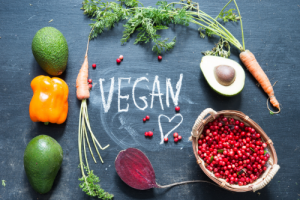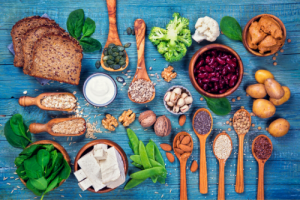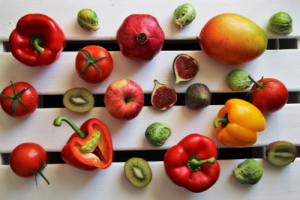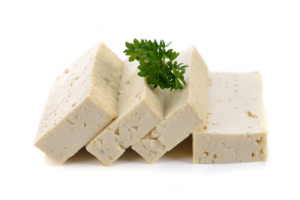If you’ve been following me for a while, you’ll know I don’t subscribe to any particular type of diet.
When a client comes to me, my goal is to help them find the best style of eating to support their preferences, goals and lifestyle- not to try and fit them into a specific dieting protocol. The best diet out there is the one that is sustainable for you in the long term- and there is NO reason that you must exclude certain foods or food groups out of your diet simply because they aren’t on the list of ‘approved’ foods in a certain diet.

Lately, I have found that I have been receiving LOTS of questions about veganism.
As mentioned above I DO NOT promote any specific diet. While there are many benefits to including more plant products like vegetables and fruit in your diet, the vast majority of us will see optimal health while continuing to eat some animal products.
Firstly, if you would like to become vegan because of ethical reasons associated with the killing and treatment of animals- I am not here to tell you otherwise. This is NOT a post about the ethics of veganism.
I am also not here to get in an internet fight about different diets. Yes- there is a lot of evidence to support that a vegan diet CAN promote health, when done correctly. There is ALSO a lot of evidence to support an omnivorous diet for optimal health.

The thing is, a vegan diet is just like any other diet– for some people, it might be great!
And for others, it may actually worsen their health, relationship with food, and body composition.
It is important to remember that if you go from eating tons of processed food with lots of sugar and trans-fats and little to no vegetables, and then start eating a vegan diet INCLUDING ADDING VEGETABLES AND FRUIT…. Then it is no surprise you feel amazing on a vegan diet.
Its not being vegan that is changing your life, its the inclusion of more whole, nutritious foods.
Here’s the thing no one wants to talk about- YOU CAN DO BOTH.
You don’t have to go full on vegan in order to enjoy health benefits from eating more plant based foods.
You CAN eat lots and lots of plants, veggies, fruit, nuts, whole grains, tubers, etc….. AND you can eat high quality animal products as well.
It doesn’t have to be one or the other for health- in fact, it should be both.
If you are reading this and thinking… ‘NOPE, I’m going vegan!’… here are a few things to consider-
Going vegan might be a really bad idea for you if:
-
You have a history of disordered eating or restrictive dieting.
-
You’re only doing it to lose weight.
-
You have a gluten or grain sensitivity, or legumes like lentils and garbanzo beans make you bloated or hurt your stomach.
-
You don’t want to plan ahead or cook at home.
-
You don’t know or aren’t willing to take the time to learn about the macronutrient composition of the food you eat.
-
You’re not willing to pay close attention to your biofeedback and potentially include key supplements like Omega 3, Zinc, B12 and others in your daily routine.

If you read this and identify with any of these reasons to NOT go vegan, but you would still like to reduce your intake of animal products- great! My advice would be to focus on quality over quantity- when you DO eat animal products, choose high quality free range eggs, wild caught fish and organic meat.

You don’t need to worry about the vegan police. They’re not going to snatch you out of bed at night for eating a couple of eggs with breakfast. Just like the meat brigade isn’t going to beat you up for having tofu for lunch.
So to wrap this all up- Should you become 100% vegan for health reasons?
Probably not.
Can you eat more plant based meals and improve the quality of your food by perhaps paying more attention to what types of animal products you consume on a regular basis? DEFINITELY.
For help on how to navigate a dietary change, or to learn more about how to pay attention to the signs your body tells you about what you should or shouldn’t be eating- write to me, and lets set up a call to talk about the changes you would like to make.


